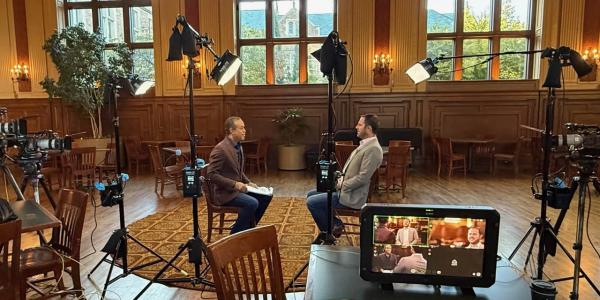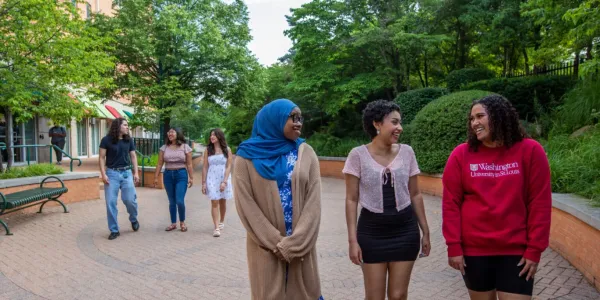The new professor of practice discusses his upcoming book, public scholarship, and preparing to teach political science.

When Ryan Burge joined the John C. Danforth Center on Religion and Politics in August 2025 as a professor of practice, he brought an uncommon background. A former Baptist pastor in small-town Mount Vernon, Illinois, Burge is now shaping the national conversation on the current state of organized religion and its influence on society. He is the author of the popular data-based Substack Graphs About Religion, and he is frequently quoted in the national media. His fifth book, ‘The Vanishing Church’ (Brazos Press), will be published in January 2026.
Burge spoke with the Ampersand about his outreach and his new role at WashU, where he will teach undergraduate courses through the Department of Political Science.
Your Substack, “Graphs about Religion,” has more than 26,000 followers. Why do you think your charts and articles resonate with others?
Religion affects everyone, including people who try to stay out of the fold. I like to say that even if you feel like you’re done with religion, religion isn’t done with you. Religion-based policies can affect a person’s health care, their ability to marry, where they can send their kids to school, and other fundamental aspects of their life. The trends that I follow say a lot about our country and society.

Why do you take the time to write for the general public?
Public outreach is part of the fundamental mission of the Danforth Center. My articles, social media posts, and interviews with journalists all help build on that mission. I’ve cultivated a very public-facing profile over the years. Most of my work is aimed at people who are interested in the facts behind some important trends in religion and politics. I try to explore those trends in a compelling, interesting, informative, and accessible way.
Your book, ‘The Vanishing Church,’ publishes in January. How does the book differ from your newsletter?
The book will have a lot of the information and data analysis that my regular readers expect, but it will also have a lot more of me. When I’m creating a graph or writing an article for my Substack, I’m mostly just a conduit for the data. But the book shows more of my personality and goes more into my history, which is foundational to my work. I was a small-town pastor for 20 years, and now I’m working at one of the country’s most prestigious universities. It’s a story that I’m looking forward to sharing.
You’ve become a go-to source for national media stories on religion and politics. Why do you make that effort, and what advice would you give to other WashU researchers who are approached for interviews?
In my mind, speaking with the media is an extension of my job. I’m here to help spread information. As a benefit, I’m helping to remind readers about the importance and impact of a university like WashU. They see that faculty are thinking about the issues that are important to them. I would encourage other researchers and professors to practice explaining the importance of their work to people outside of their field. If they get a request for a media interview, they’ll be ready.
What are the parallels between preaching and teaching?
Being a pastor was excellent training for teaching. Whether you’re in a church or a classroom, you’re trying to convey information and connect with the audience. Your goal is to encourage, inspire, and equip the people hearing your words.
There are also important differences. Preaching is mostly a monologue, but teaching has to be a dialogue. My classes are very participatory, and I encourage a diversity of viewpoints.
How has coming to WashU changed your work and your impact?
I’ve only been here for a few months, but I’m amazed at the level of support. The university clearly cares about public outreach. I was interviewed by Maurice Dubois from CBS News on campus earlier this month, and the Office of Public Scholarship went above and beyond to make sure everything went smoothly. At WashU, there are no barriers or limitations. I’m grateful to be here.
Header image: Burge speaking with CBS News on the Danforth Campus (Credit: Courtesy of Burge)





